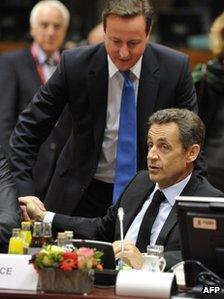Analysis: An EU of two tiers after eurozone debt crisis
- Published
- comments

Mr Cameron (background) was not included in the key summit talks
As another euro rescue package emerged from the summit in Brussels, a big new political question came with it: has the crisis created a two-tier EU with the insiders, the 17 eurozone countries, driving decision-making, while the 10 euro "outs" are not even in the room?
The sight on Wednesday evening of the leaders of the UK, Sweden, Poland and others flying in only for the aperitif but not invited to the dinner, and absent from the all-night talks, appeared to symbolise the new set-up.
Charles Grant, director of the London-based Centre for European Reform, external, calls the change fundamental: "Henceforth, there will be two clubs: the broader EU and the new euro club with its own rules and institutions."
Josef Janning, director of studies at the European Policy Centre, external in Brussels, says: "The momentum of integration will focus on the 17. I see a widening gap between the 17 and the rest."
Until the euro crisis, the EU was run by the leaders of the 27 member states in the European Council - even though some countries had opt-outs, such as the UK and Denmark from the euro, and the UK and Ireland from the passport-free Schengen zone.
Now parallel structures are emerging.
Wednesday's summit agreed 10 steps to formalise the running of the eurozone: euro summits will take place at least twice a year (not necessarily when the EU 27 meet), prepared by the euro finance ministers - with agendas encompassing economic and financial policies and competitiveness.
There have always been separate decisions directly on the euro but this is more than that.
For now, Herman van Rompuy will preside over both the euro and the EU summits but in future, the inner core may have a different, permanent president.
Pale shadow
The eurozone inner core is a pale shadow of the visionary calls of European federalists in the 1990s for an "avant-garde" core Europe.
Given the depth of the euro crisis, few of the 10 "outs" will jump into the euro any time soon. Even so, the "outs" are worried.
Richard Corbett, adviser to Herman van Rompuy, the European Council president, says most policy "will remain for the 27: the single market, rules on consumer protection, competition, trade and other areas like environment or justice and home affairs".
But Fredrik Langdal of the Swedish Institute of European Policy Studies , externalsays: "The Swedish government is clearly very concerned at the prospect of a two-speed Europe.
"They fear the euro 17 could decide on issues affecting the 27 such as banking, resource allocation, the EU budget."
British Prime Minister David Cameron has expressed similar concerns.
According to one senior EU official, Mr Cameron wanted a safeguard clause at the summit but "didn't get it since firstly, it would accelerate the split, and secondly, only two countries will eventually not be in the euro [the UK and Denmark]".
Nor are the "outs" a unified group, says Mr Langdal: "Sweden won't want to ally with Eurosceptic UK."
Back to the future?
There is a sense of deja vu here.
When the original six member states founded the EU (then called the European Economic Community) in 1958, the UK instead set up the European Free Trade Area (Efta).
But the Efta was less powerful and so the UK joined the EU in 1973 - followed in 1994 by other Efta members including Sweden. Now a two-tier Europe is back.
And there is little patience in Brussels for the UK's desire to both preserve its influence in the two-tier EU and repatriate several policy areas.
Says one senior EU official: "The mood in Brussels is 'go off and have your referendum and sort it out and if you want to be Switzerland and just adopt all EU legislation, and pay money into the budget without a say, go ahead'."
German core
German Chancellor Angela Merkel dominated the outcome of the eurozone's emergency summit on Wednesday but does this mean the inner tier of 17 will inevitably remain German-led?
Fredrik Langdal says: "The inner core will be very much up to [German Chancellor Angela] Merkel and what it can do and what it decides. France is not that strong. Germany is the only strong player."
A senior diplomat from a smaller euro member state has mixed feelings: "We do not feel very comfortable with the de facto directoire of France and Germany but thank God we've at least got that, with [French President Nicolas] Sarkozy and Merkel trying to save the euro."
And the European Commission will still have an important role to play.
Josef Janning argues that the political dynamics of the 17 are highly unpredictable: "The dividing lines are within the 17, not outside. It will be more ad hoc, lacking the stable coalitions of the past."
Whether the eurozone publics will support a more integrated inner core intruding more into national policies is at best an open question - they have not been asked.
But if and when treaty change comes on the agenda, there will be tricky ratification politics across the eurozone.
A two-tier Europe has arrived but with the euro 17 at its core - not the single market or environmental or foreign policy - if growth does not bounce back or the euro falls apart, there will be little to fall back on.
A two-tier EU could be a fragile construct.